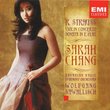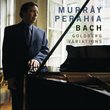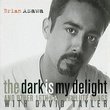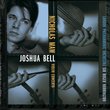| All Artists: Giacomo Puccini, Zubin Mehta, Royal Opera House Covent Garden, Plácido Domingo, Carol Neblett, Sherrill Milnes, William Elvin, Robin Leggate, Paul Crook Title: Puccini: La Fanciulla del West Members Wishing: 0 Total Copies: 0 Label: Deutsche Grammophon Release Date: 10/25/1990 Genre: Classical Style: Opera & Classical Vocal Number of Discs: 2 SwapaCD Credits: 2 UPC: 028941964021 |
Search - Giacomo Puccini, Zubin Mehta, Royal Opera House Covent Garden :: Puccini: La Fanciulla del West
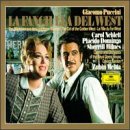 | Giacomo Puccini, Zubin Mehta, Royal Opera House Covent Garden Puccini: La Fanciulla del West Genre: Classical
|
Larger Image |
CD DetailsSimilar CDs
Similarly Requested CDs
|
CD ReviewsWonderful but... Michael Newberry | Santa Monica | 12/03/2001 (4 out of 5 stars) "This past year I have been addicted to La fanciulla del west. I would definitely include it in my all-time favorites, let's say Top Ten. Magnificent music. And a well told story. The only apparent problem it has is that it needs a great soprano with a huge voice. Many commentators have commented that the soprano role is extremely difficult, which they attribute to its high-flying range. But after listening to it often I propose that it is difficult for another reason: the orchestra does not support her lines. Perhaps I state it badly; in Turandot's In questa reggia, the music soars with her, and her melody is also present in the music. In Fanciulla she must go it alone. It means that her vocal line must compete against some of the most glorious and dramatic music in existence; and not only is she pitted against the orchestra but against the supported tenor, the baritone, and the all-male chorus!This recording is very good. Domingo is ideal as Johnson. Zubin Mehta conducts Puccini brilliantly: well-paced, colorful, passionate, sparkling. Milnes sings with all his assets of a beautiful, a dark, and a ringing voice. And Carol Neblett sings firmly with all the notes. But her singing seems as if it is for a supporting role not as if she were the vocal track for Liberty Leading the People, she doesn't command the opera.Probably the best Fanciulla, with good sound, is with Tebaldi, Del Monaco, MacNeil, and with Capuana conducting. Though Tebaldi is not one of my favorite singers she has a magnificent voice--that seems to give her whatever she asks of it. She also sings with passion and sensitivity. Del Monaco is not great with character but he has a wonderful ringing sound and a big male persona. I think he is excellent here. MacNeil as Rance is very solid; he sings with a beautiful line.Unfortunately, there isn't a completely knockout studio recording. Indulge me in my only musical fantasy. I would have liked, as dream cast, Domingo, Mehta, Gobbi, and Jessye Norman. I think she would do justice to the role and perhaps she will." Puccini's extravagantly scored Western touches the heart. 10/22/1999 (5 out of 5 stars) ""Fanciulla" is an opera in which Puccini was trying to expand his idiom, both musically and dramatically. As this crisply recorded and passionatly sung release proves, he succeeded in both areas. Domingo is at his golden best, but I was particularly impressed by the "Sherrifo" of Sherrill Milnes, who makes Rance seem uncommonly sympathetic. While "Chella mi credo" is the aria most often excerpted from this opera, it is, by no means, in my opinion, it's most compelling moment. The first act love duet, Johnson's dramatic pleas for understanding in Act II, and of course the final standoff at the end of the third act, all show Puccini at his heart-rending best. The score is harmonically more sophisticated than any previous Puccini opera, with strange dissonances that give the music a lonely, melancholy atmosphere that fits the story like a glove. Yes, the story has a happy ending, but as Johnson and Minnie ride off into the sunset, I promise you'll feel a lump in your throat as the assembled miners sadly sing "We'll never see her again, no, never."" Almost perfect... Michael Newberry | 01/06/2000 (4 out of 5 stars) "This is probably Puccini's most underrated work. It used to live happily some half-a-century ago, when Oliviero and Tebaldi sang their thrilling Minnies, but now it's not fashionable anymore. Fortunately we have a great recording like this, that makes us aware of the real quality of "La Fanciulla". Mehta provides for the most puccinian conducting anybody ever heard, and Domingo and Milnes just make their characters talk to the listeners. What is really missing, is a truly good Minnie: Neblett singing is appropriate and passionate, but the voice doesnt't sound great and Italian diction is really poor. Anyway, the best overall recording of "La Fanciulla del West"."
|

 Track Listings (22) - Disc #1
Track Listings (22) - Disc #1
